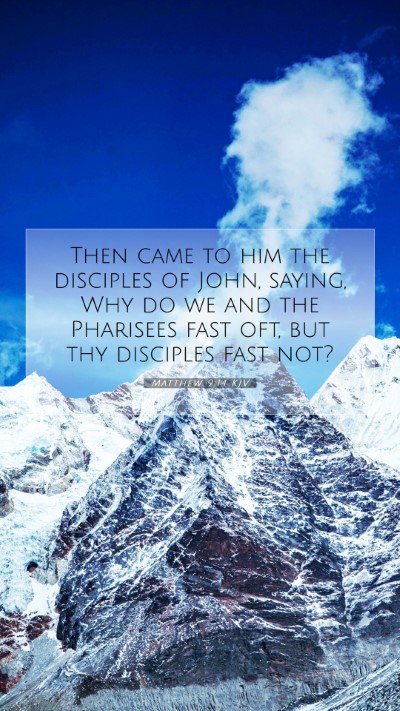Bible Verse Commentary: Matthew 9:14
Matthew 9:14: "Then came to him the disciples of John, saying, Why do we and the Pharisees fast oft, but thy disciples fast not?"
Understanding the Context
The questioning of John the Baptist's disciples reveals a significant interaction regarding religious practices and the nature of Jesus’ ministry. Fasting was a common practice among the Pharisees and others who sought spiritual discipline. This passage provides insight into Jesus' approach to spiritual life and community.
Insights from Public Domain Commentaries
Matthew Henry's Commentary
Matthew Henry explains that this passage highlights the difference between the religious rituals of the Pharisees and the joy that accompanies Jesus’ presence. Fasting is presented as a solemn act of devotion, but Henry emphasizes that the true essence of spiritual life is found in the kingdom of God which is present in Christ. He suggests that while fasting has its place, the focus should rather be on the relationship with Jesus and the spiritual joy that comes from it.
Albert Barnes' Notes on the Bible
Albert Barnes delves into the implications of fasting and why it was not part of Jesus’ disciples' practice. He points out that fasting is typically associated with mourning and repentance, and since Jesus, the Bridegroom, was among them, it was inappropriate for His disciples to fast. Barnes emphasizes that this moment is pivotal for understanding Jesus' mission, which brings hope and joy rather than sadness. The presence of Christ changes the paradigm of religious observance.
Adam Clarke's Commentary
Adam Clarke provides a thorough analysis of the cultural significance of fasting in Jewish society. He notes that the disciples of John were accustomed to fasting and expected the same from Jesus' followers. Clarke emphasizes that Jesus' approach to spiritual life transcends mere ritualistic observance. He suggests that this passage invites believers to reflect on the motivations behind their spiritual practices and to align them with the joyous experience of faith in Christ.
Interpretative Themes
- Joy in Jesus: The presence of Jesus is a reason for celebration, not mourning.
- New Covenant Fulfillment: Jesus' ministry heralds a new approach to relationship with God that is rooted in joy rather than obligation.
- Contrast with Legalism: The verse highlights the conflict between the Pharisaic legalism and the freedom found in Christ.
Bible Study Insights
This passage is essential for understanding Scripture and Jesus' teachings on the nature of true worship. It invites believers to consider how they practice their faith—whether through joy or obligation. This awareness can lead to deeper Bible verse understanding and interpretations in various contexts.
Application to Daily Life
This verse encourages individuals to re-evaluate their spiritual practices. Understanding the significance of joy in the Christian life, as Christ exemplifies, can lead to more authentic expressions of faith.
Related Bible Cross References
- Matthew 6:16–18: Jesus teaches about fasting in private and not for public display.
- Luke 5:34–35: Similar discussion on fasting in the context of Jesus' presence.
- Mark 2:18-22: Discusses the reason for fasting and its appropriation in relation to Jesus.
Conclusion
Matthew 9:14 serves as a pivotal scripture for understanding the heart of Jesus' ministry and the joyful relationship believers are invited into. It encourages reflection on the motivations for spiritual practices, emphasizing that true faith is marked by joy found in Christ.


